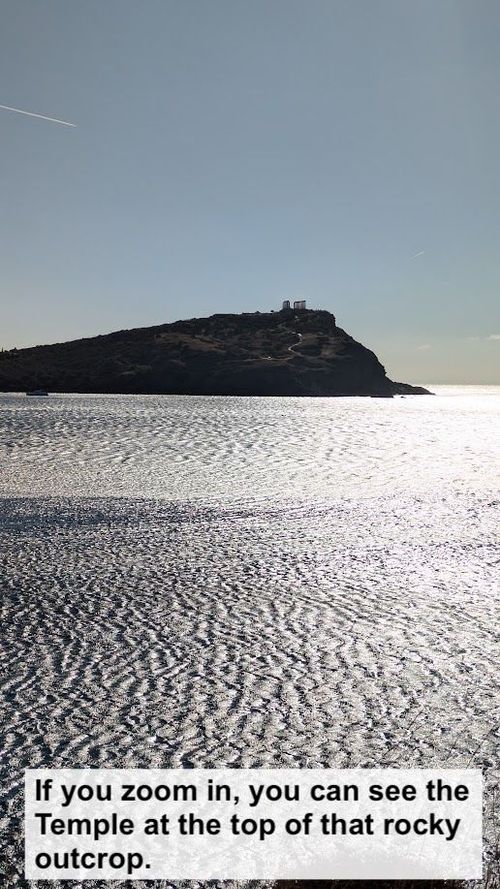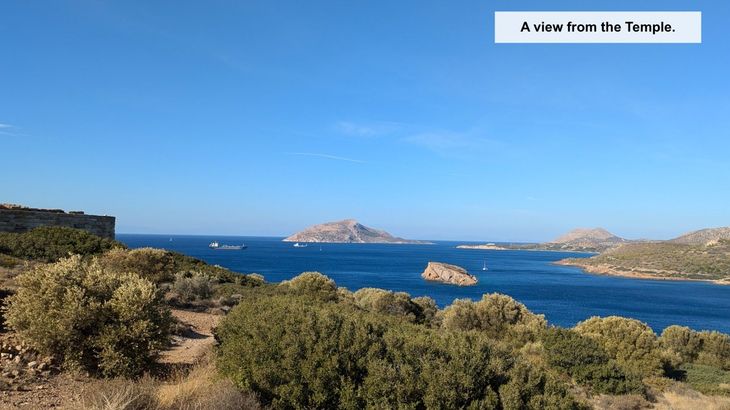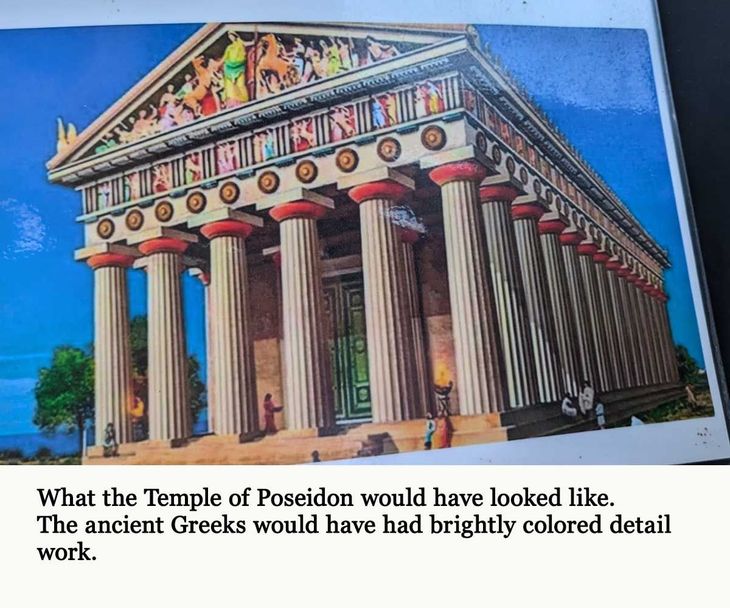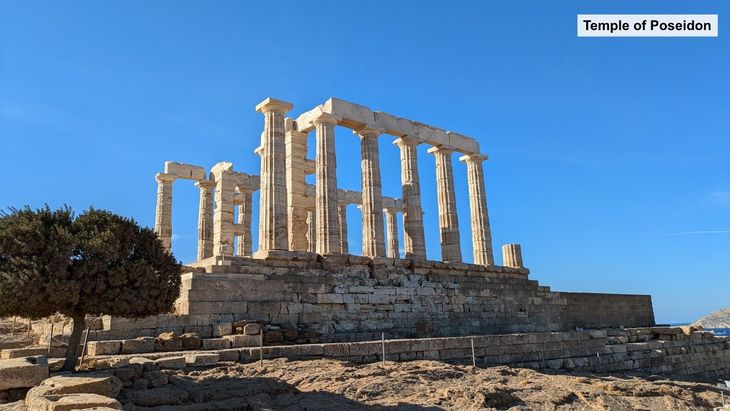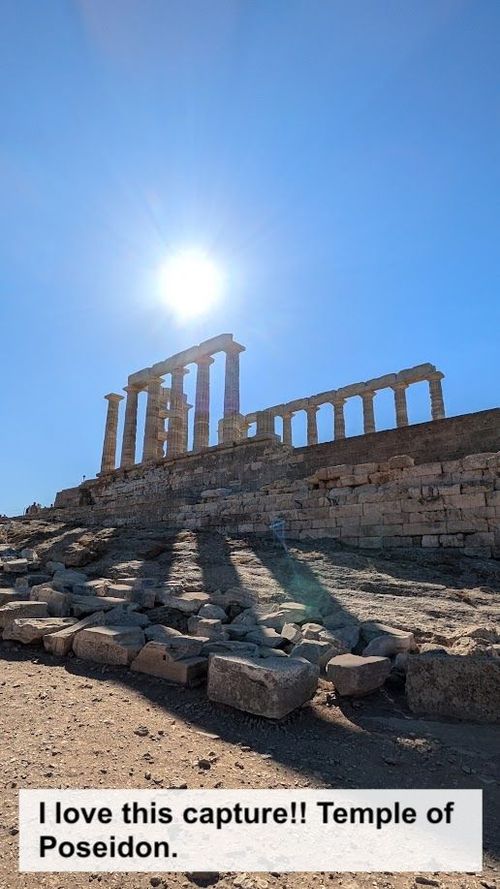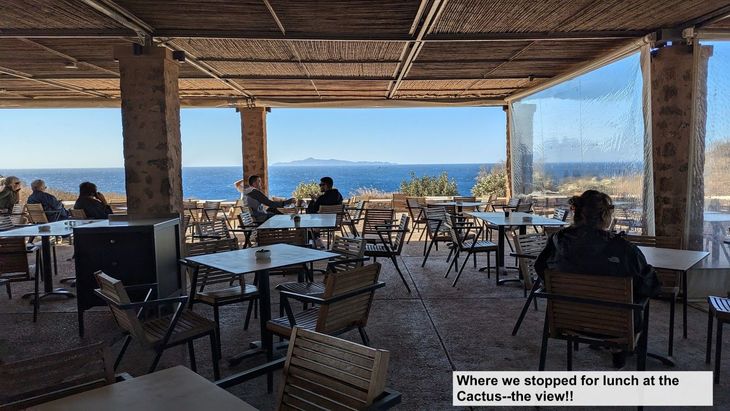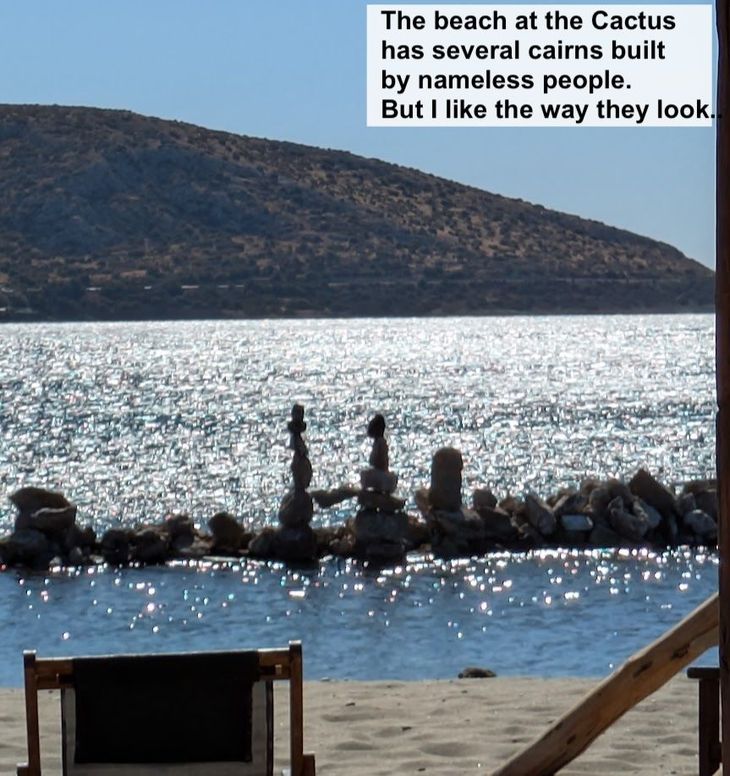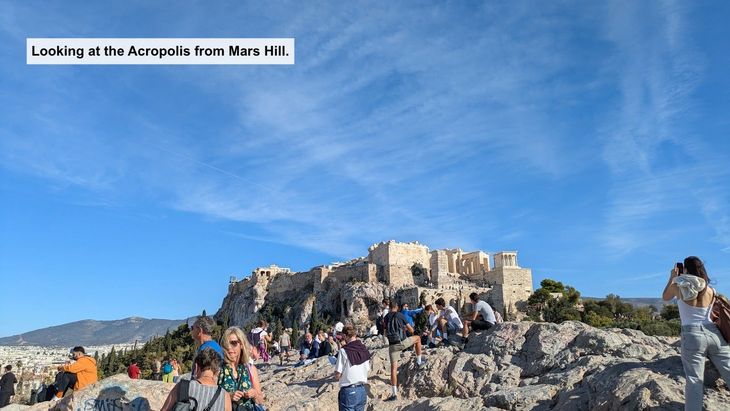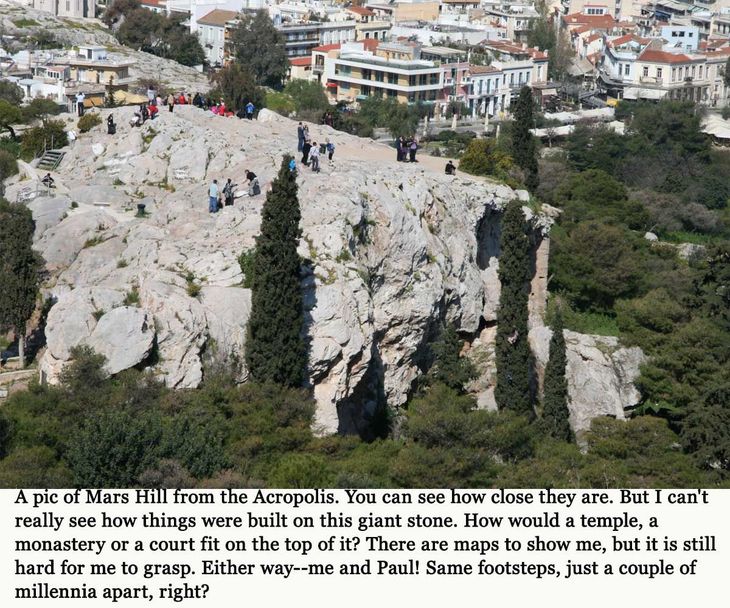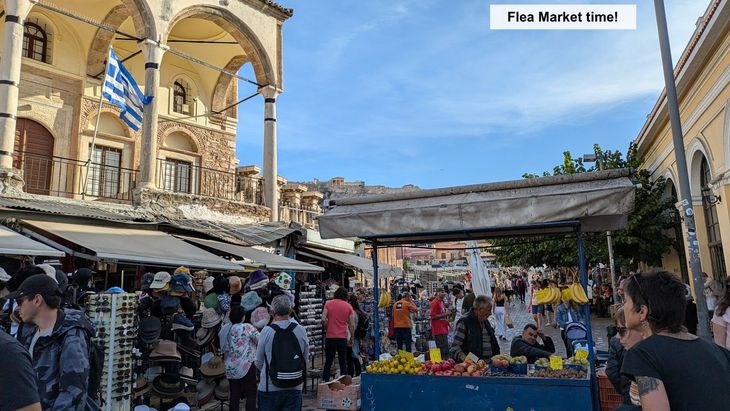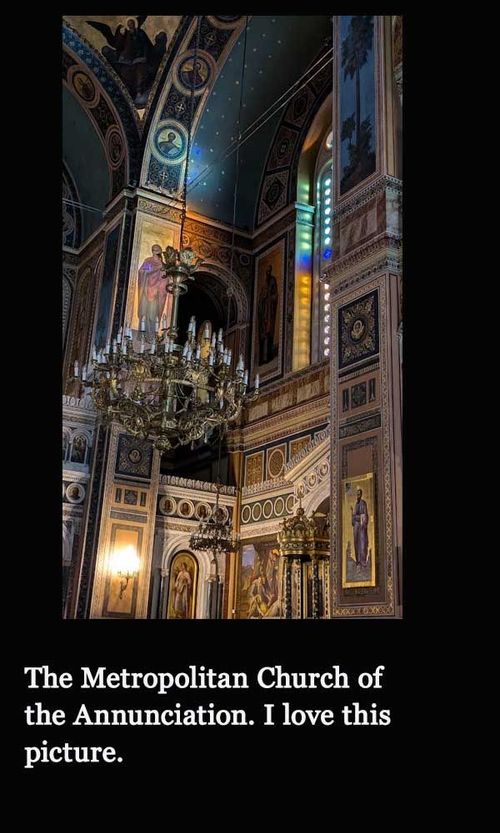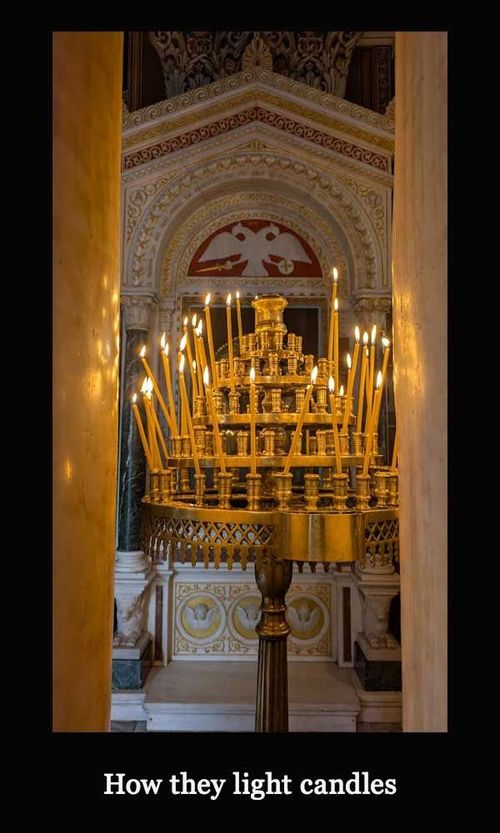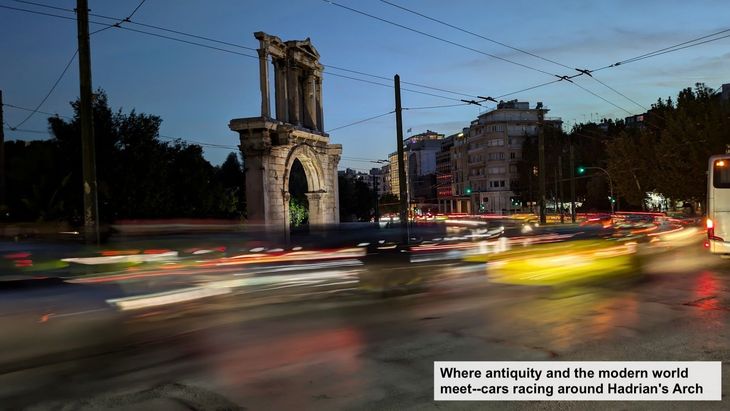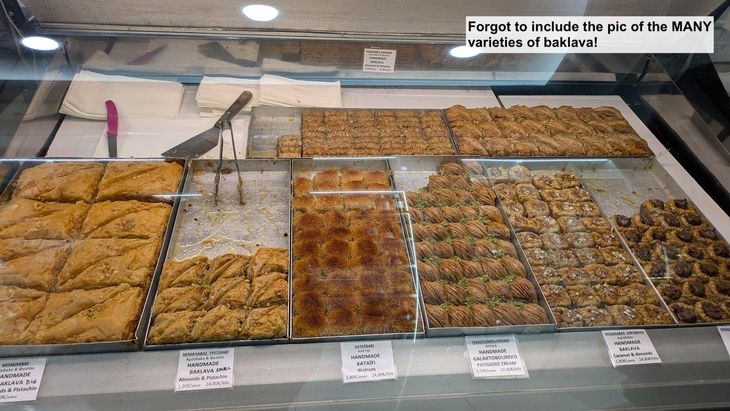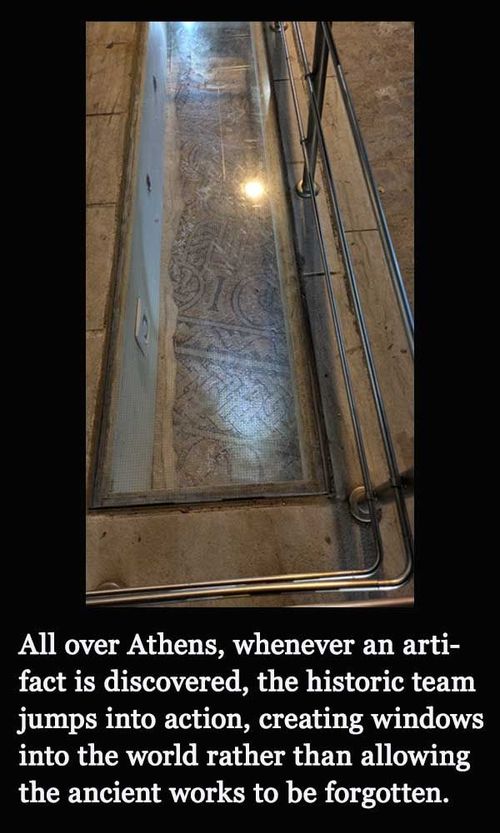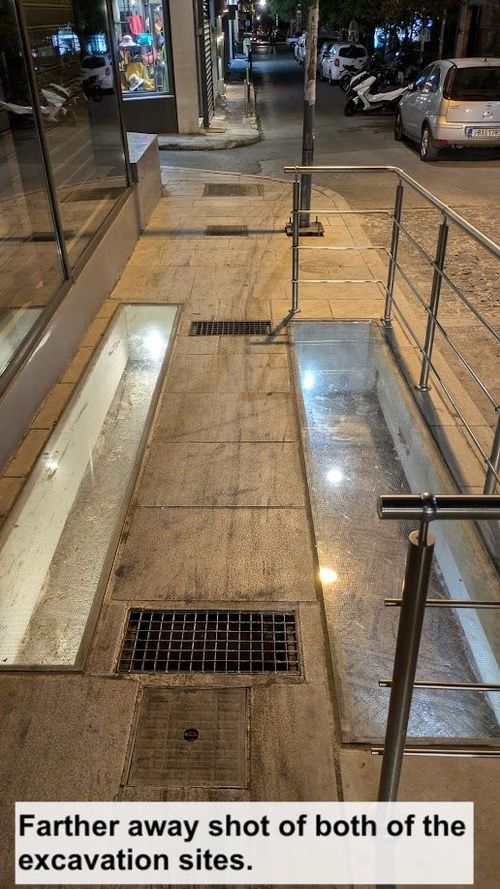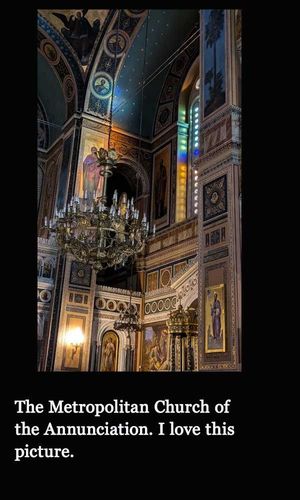46 Blog Post, Tuesday, October 22, 2024 “Gods and gods”
My gosh—someone is baking bread! Some restaurant or bakery has clearly taken loaves and loaves of bread out of the oven and they are being cooled somewhere near our apartment. This is a city of fresh bread, fresh cheese, fresh vegetables, fresh fruit. And even at 10 pm, in preparation for tomorrow’s busy day, the bread has just been taken out of the oven and our apartment smells like a bakery. Although we have eaten well today, as we do every day, the smell is both distracting and attracting. But I digress…
Today started with a visit to an ancient temple. The temple of Poseidon is located on a spit of land called the Cape of Sounion, about an hour and a half from the center of Athens. We got there by mini-bus on a tour with a snappy young Greek tour guide named George, who was only 20 years old, but who had an enormous amount of Greek history stored in his young brain. Alistair hadn’t even heard of some of the Greek conflicts and wars that George spoke about, making him scramble for references on our friends Wikipedia and Google.
We drove along the coast the entire time and I never got tired of seeing the blueness of the sea to my right. I am mesmerized by it, and today was a ‘sun dance’ day. It was almost too bright to look at the sea with the blaze of sun igniting it. The sky seemed to be trying to show off its own blue beauty to rival the sea. I am often speechless and wordless as I look out at a body of water I have spent nearly 64 years trying to visit. And now here we are. How can we put beauty into words? And then we arrived at the temple.
The temple we visited is perched high above the sea, almost like a lighthouse, but one that was originally built in 700 BCE (Before the Common Era), and it provided a lookout for miles across the sea, giving the residents advance notice of any approaches by foreign armies. The wind was absolutely ferocious today, and my own hair (which I affectionately refer to as Medusa hair on windy days—perfect place for that, right?) was whipped around so hard that I thought it had actually injured my eye at one point, but we continued to tour and walk the grounds, descending closer to the sea and then climbing up to re-visit the temple.
As I stood at the apex of the hill, the towering, stark ruins of the temple just behind me, I thought “I totally understand why people would create a god of the sea if they lived here.” What I meant was that the sea and the wind and the elements are so powerful and overwhelming at times that I could see why people wanted to create a Someone to whom they could speak, a Someone with whom they could reason, a Someone who could potentially control what the people could not control—wind, water and sun. If you and I had no experience of the God of creation, we might be tempted to do the same thing.
Actually, we DO the same thing. We make mini-gods out of our horoscopes, or even weather reports. We make major gods out of finance and sometimes out of our desperation with health concerns. We look right by the God who created us and we try to find another nameless god who we think may help us if we do the right things—give to charity, volunteer, show kindness to someone we don’t feel very kind towards. Sometimes it isn’t even the creation of these mini or major gods, it’s just plain old superstition that ends up ruling the day, and superstitions have the strange ability to loom large in our lives.
Let me give you an example. As I travel, I am ‘carrying’ two people who need prayers. Both of them are in situations that seem beyond their ability to cope, one is health-related, and one is jo- related. Every church I visited, I have brought those two people in with me, at least spiritually, and I have lit candles and said prayers for hope and healing. At times I have been in tears, asking God to help more, to do more. And one morning I found myself bargaining: “God if you will heal my friend, I will…” BAM! I just jumped feet first into a kind of pseudo-God relationship that is based on what I do, how much favor God will show me—the whole works.
The Greek gods all had unique personalities. Poseidon, for example, was furious that Athena had won the battle against him as the ‘head god’ of the city, giving her name to the metropolis—Athens. So courting the favors of these gods and goddesses wasn’t easy or predictable, and one of the problems with having lots of gods and goddesses is that you might inadvertently leave one out. The people had to keep up with Corn gods or Sun gods or Cattle gods, among so many others. I’m just making those up, but you get the point.
From the pinnacle of Poseidon’s Temple, then, and back to Athens where Alistair and I found ourselves up on top of Mars Hill, which I spoke about yesterday. Mars Hill is a giant hunk of slippery marble that rises about 350 feet above the land below, and it is the former site of the Areopagus, or the court of Athens, built in the 7th century BCE. This court determined verdicts in civil, criminal and religious matters. It is also the site of Paul’s famous speech to the Greeks in Acts 17.
By the time Paul speaks to the Greek rulers, the Acropolis, with its temples to Athena and Nike, among others, towers over Mars Hill nearby. But Paul wanted to make sure that the people of Greece knew about the one God, the creator God of all rather than the multiple, fickle gods of smaller things. His courage and eloquence take my breath away as he refers to the Greeks and their ‘Unknown God’, because the Greeks actually had a catchall god in case they missed one! Paul saw this altar to an unknown god somewhere in the city of Athens and decided that he needed to teach people about the God who knows us, and a God that we can know as well. But we don’t create our God. In fact, our God created US! First Paul preached in the synagogue, then in the marketplace and finally he was invited to speak at the Areopagus, located on Mars Hill. The Bible tells us that a few people were converted, but the majority of people stuck with their mini-gods and superstitions. Basically, they stayed in their comfort zone and I certainly get it! Paul was a crazy man of Jesus, speaking about issues of faith in the midst of a people group that was enslaved to appeasing the gods. Only a few people got the message and became followers—Dionysus—a member of the Areopagus and Damaris, a local woman. But it was enough, and it was a beginning.
As I sat in the hot sun at the top of the rock, looking around at all the tourists, I wondered how many of them were there because they knew who Paul was. I didn’t think many of them knew the story. And no, I didn’t stand up and start quoting Paul either! But I couldn’t get over the fact that I was standing where Paul had stood nearly 2000 years ago, preaching a message that is still being preached every day around the world. Follow the God you know, who knows you, who loves you.
As I sat there, I also began to pray that God would give me courage when I need it to speak the truth plainly and with love, as Paul did that day. I prayed for my two people that I am spiritually ‘carrying’, that God would provide healing and blessing in their lives rather than chaos and unwellness. I didn’t make any offering beyond my own heart and self, my time and my words. I stood where the Apostle Paul stood. Still astonishing. Still humbling but also strengthening as well.
Alistair and I then did another grand walking tour of Athens, visiting the Flea Market, which takes place every day in downtown Athens close to the original Roman Agora, or marketplace, which was built around the 4th century CE (the Common Era). We also were able to visit several Orthodox churches in Athens whose doors were open. The first one was tiny and barely had room for 10 people, but candles were burning, and a woman stood guard at the door, watching over the tourists. This was the Church of the Metamorphosis. I lit a beeswax candle and prayed for my two people. The next Orthodox Church was holding a prayer service of some sort. As we walked into the doors of the Holy Metropolitan Church of the Annunciation, we could hear the ancient chants being sung and repeated: “Kyrie Eleison!” The celebrant’s back was towards us, and he wore a headdress of some sort and rich red robes with elaborate stitching. I sat, once again to pray for those I loved, and when the prayer service was over, the priest simply closed the doors of the icon screen and disappeared. Fascinating but foreign.
The churches provided me with a reset button every time I wandered into one, and I think we visited four different churches today. None of the temples I visited prompted that response from me. I think Alistair was impressed by the design work, but I felt the presence of God in the deep mystery of the Orthodox service, and it was comforting and familiar to me, grounding me once again in something my heart craves, an experience of the holy in the midst of the everyday, a re-connection with God and the people of God.
And so from bread of the gods, to bread for the people, another day in Athens concludes, and we continue to say “We don’t have enough time here!” Tomorrow, our last Athens day, has a long agenda as we try to visit places of interest to us—the Museum of Ancient Technology (Alistair) and the Church of St. George Lycabettus, perched on top of a hill and visible from most of central Athens (me).
We are nourished in many ways, but bread is one of God’s great gifts. When was the last time you had really great bread?
Blessings and grace,
ML+
